Before
Before
Dad: Money
Mom: Host family, packing enough, and safety
Me: all of the above and traveling outside the U.S., social norms, language barrier, academic environment, courses, people, and anything and everything that I forgot to mention.
Above, I have listed my parents' and my own anxieties and fears about leaving the United States for the coming semester. I can still hardly believe that I am already a junior in college and I am about to begin this incredible yet also terrifying experience in one week. The entire process, from applying to study abroad through Susquehanna's GO Office and through IFSA-Butler to everything I have done since to prepare myself for this semester abroad is entirely new to me and my family.
The same is true when I was applying to colleges, scholarships, and getting ready to leave for college. Since neither of my parents and my older brother went to college, I did not have any help from my family during my college application process, unlike some of my old high school friends. I never really thought about it during the process. Ever since late middle school and throughout all of high school, I was very academically independent. So when it came to applying to colleges, nothing change. I had a bit of help from my high school guidance counselor, but otherwise, I did everything on my own.
Preparing to leave for college, however, was a slightly different case. Not only did I have to pack material items, but I tried to mentally and emotionally prepare myself for an experience that I really did not know much about. I did not grow up with stories of my parents' college experiences. Sure, I had older high school friends that went to college, but I never stayed in touch enough to hear about a full college experience. Many people say that college was the best four years of their lives, but aside from stereotypical representations of college, I did not know what I was in for.
The same is true about studying abroad. All of my peers who have done it have said it was one of the best, if not the best, experience of their lives. Sure, I have also heard stories, but for the most part, I do not know a lot about what I am in for. It's true that Susquehanna's Pre-departure class and IFSA-Butler have given me a lot of advice on what to do to prepare myself for this experience, but there are still so many things that I probably don't even know I will encounter. And I realize that is one point of the experience, but it does not bring comfort to someone who likes to plan out different aspects of their life every few months.
All of the information-packed documents and packets that I've received from IFSA-Butler have been extremely helpful in quelling many of my anxieties, but I still have many more. And again, I know the point is that I will have to figure things out for myself, at this moment in time, it is still unnerving. On the contrary, six months from now, I bet I will feel just the opposite.
Oh, have I forgotten to mention the questions? Oh the questions. Like me, my parents want to know what I am in for to comfort their own nerves, but like preparing for college, I simply cannot answer most of them or I can only answer them just after I find an answer to my own question that I posed.
So a week from leaving, I've started packing (keep IFSA-Butler's packing list handy), and have most of my official documents in order. I get more anxious every day, but I know that what I am about to embark on will be an amazing experience.
More Posts from Simplyphytoplankton and Others
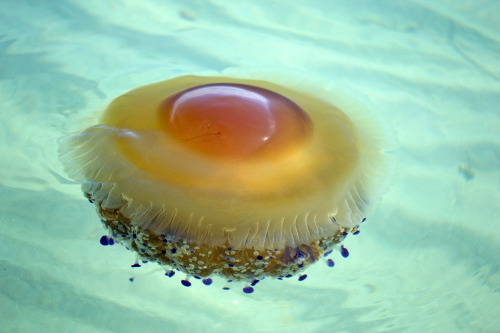

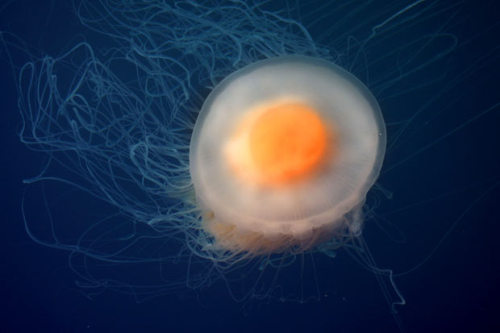
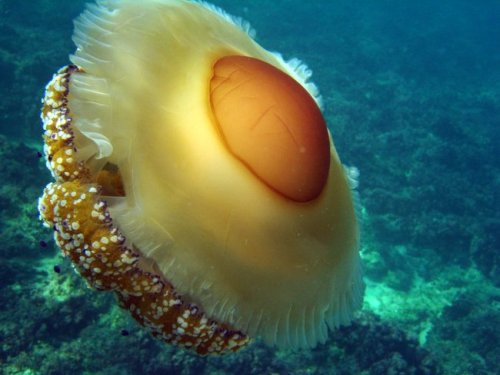
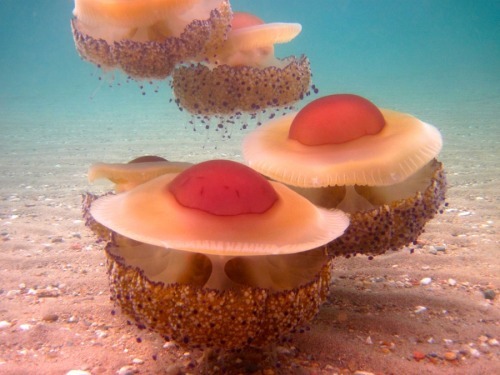

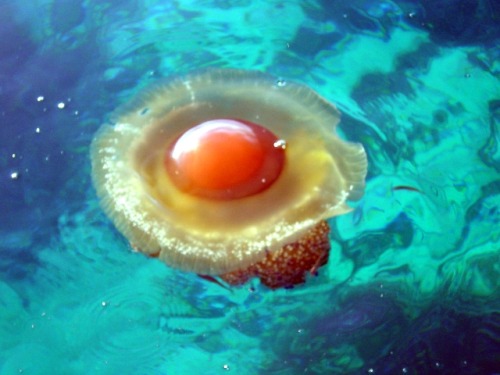
Fried Egg Jellyfish Are Kind of Adorable – & That’s No Yolk.
There are two species that hold the whimsical title of “Fried Egg Jellyfish”: Phacellophora camtschatica and Cotylorhiza tuberculata though the two are quite different from each other in all aspects beside appearance.
Phacellophora camtschatica is a huge jelly that prefers colder waters. It’s bell can reach up to 2 ft across and its dozens of tentacles reach over 20 ft long! If you don’t think this floating egg creature looks very menacing, you’d be right. It has a very weak sting and many small crustaceans take advantage of the jelly by riding on its bell (breakfast to go…?) while snatching up extra food.
Cotylorhiza tuberculata is a much smaller jellyfish that hangs out in warmer waters. It only reaches about 35 cm in diameter, so don’t go for this Fried Egg Jelly if you want a big breakfast. Unlike most jellyfish, C. tuberculata can swim on its own, without relying on the currents for movement. It’s sting (if you can even call it that) is so feeble that it has very little to no effect on humans at all. I mean, it does look like a breakfast food, after all… how powerful could it be?





Trump’s War on Science continues


🗽click here for more🗽
🗼also follow us on insta!🗼


(source)




Hatfield Marine Science Center:
Sashay the Pacific Giant Octopus Gets Released Sashay, our stunning and extremely friendly Visitor Center octopus was released back into the wild on November 26th. After being gently introduced into the Yaquina Bay, she temporarily crawled onto land. This gave her human fans a final opportunity to say goodbye.
This type of behavior has not been seen at any of our previous releases and was an unforgettable moment for all who witnessed it. While it was difficult to bid this beautiful animal adieu, we want our octopuses to have the opportunity to reproduce and finish their lives in the wild. We hope you enjoy these photos!
Photos by Volunteer James Upton

Friendly Beluga Whale Plays Fetch With Crew of a South African Ship Using a 2019 Rugby World Cup Ball
NSF cancels grant reviews due to WH executive order
The National Science Foundation (NSF)—the major funding agency for basic science—has canceled all grant review panels this week to comply with an executive order from the new administration. This is where independent panels of scientists discuss grant proposals they’ve reviewed for scientific merit and recommend which projects get funded to NSF project managers. A LOT of work goes into setting up and scheduling grant reviews. It will take time to reschedule these panels, delaying key decisions for many promising projects. This will wreak havoc on science grant funding for months to come.
Put simply, this action along with the halting of NIH-funded grants are blatant and reckless political attacks on science, from an administration that seeks blinding loyalty.


An oceanic phytoplankton bloom in the South Atlantic Ocean. Phytoplankton blooms usually occur where cold water rushes up from the bottom of the ocean carrying nutrients to sunlit waters.
Daily Life
Weekdays
Weekends
Buses
Food
Daily life here in Costa Rica, at least for me, is not necessarily all that different or much more exciting than daily life in the U.S. The major difference is since my workload is a lot lighter here, I have a lot more free time.
A typical week may play out like this. Every day, I usually get up between 7:30-8:00 am. Even on weekends when I don’t have plans, my body is used to waking up early and I usually never sleep to my alarm. This may be because the sun is always up my 6:00 am and my internal body clock has just adjusted to this. On Monday, I don't have class until 1 pm, but I usually don't get home until 7:30-8:00 pm, which makes Monday my busiest day. I usually spend the first half of the day doing random stuff, unless I have something I need to prepare for a class, such as an exam or presentation. On Tuesday, I have class at 10:00 am until 11:40 am, and I have a break to go back home and eat lunch before I have my other class at 3:00 pm, which usually is a little under two hours.
By Tuesday night, I usually pretty tired (since Monday is always a long day) and I don't do too much since I have no class on Wednesday. This makes Wednesday a day to relax or get a head start on work for Thursday and Friday. Occasionally, I have gone on day trips. For example, one week I went somewhere with my host mom for the day and last week, I went to San José to visit two museums. The rest of my week is really easy class wise, with only one class Thursday and Friday, with both starting at 10:00 am.
On weekends, I've gone on quite a few trips, some sponsored by IFSA and some as a part of a class. Otherwise, I may go a few places with my host parents, do watch, or watch a few things on Netflix.
In order to get around, I usually take the bus. I live in Barva and la Universidad Nacional is in Heredia, so I always need to take the bus to get to and from class. One round trip costs about $0.35, and it can take anywhere from 10-30 minutes for the bus to get from Barva to Heredia or vice versa, but it usually takes about 15-20 minutes. Other buses, to San José for example, cost a bit more, but still under $1 one way usually unless it's a few hour trip. That being said, if you plan out which buses you need to take, it is pretty easy to get around, even if you're used to having a car like me.
With my host family, breakfast usually consists of eggs a mix of rice and beans called gallo pinto. We usually have freshly-squeezed orange juice as well, and my host parents also drink coffee. We sometimes have cereal or an egg sandwich too. Lunch and dinner are usually pretty similar, and almost always include rice and beans (a staple in Costa Rica). Sometimes my host mom needs to make food that's a little bit different for me because I'm a vegetarian. We almost always have either some type of fruit juice, usually made of cas, but sometimes mango, pineapple, or watermelon, or iced tea. I usually like everything my host mom makes. I don't have to do any of my own laundry, which is very different from college in the U.S. If my host mom does not do it, the maid that comes on Mondays and Fridays comes.

Blog dedicted to phytoplankton. Phytoplankton are microscopic organisms that are responsible for half of the photosynthesis that occurs on Earth. Oh, and they look like art... Follow to learn more about these amazing litter critters! Caution: Will share other ocean science posts!Run by an oceanographer and phytoplankton expert. Currently a postdoctoral researcher.Profile image: False Colored SEM image of Emiliania huxleyi, a coccolithophore, and the subject of my doctoral work. Credit: Steve Gschmeissner/ Science Photo Library/ Getty ImagesHeader image: Satellite image of a phytoplankton bloom off the Alaskan Coast, in the Chukchi SeaCredit: NASA image by Norman Kuring/NASA's Ocean Color Web https://earthobservatory.nasa.gov/images/92412/churning-in-the-chukchi-sea
158 posts